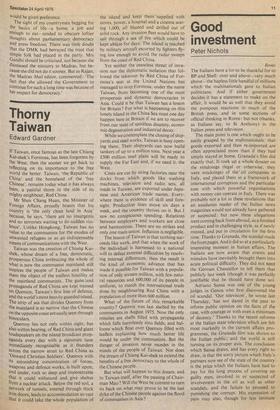Thorny Taiwan
Edward Gardner
If Taiwan, once famous as the late Chiang Kai-shek's Formosa, has been forgotten by the West, then the sooner we get back to reflecting on its importance to the free world the better. Taiwan, 'the Republic of China' and the homeland of the 'free Chinese', remains today what it has always been, a painful thorn in the side of its mighty neighbour, Red China.
Mr Shen Chang Huan, the. Minister of Foreign Affairs, proudly boasts that his country is 'the only clean land in Asia' because, he says, 'there are no insurgents and no terrorists waiting to do sudden violence'. Unlike Hongkong, Taiwan has no value to the communists for the exodus of unwanted refugees or as an indispensable means of communications with the West.
Taiwan was the creation of Chiang Kaishek, whose dream of a free, democratic, Prosperous China embracing the whole of What is now the communist mainland still inspires the people of Taiwan and makes them the object of the endless hostility of the mainland communists. The guns.`and Propaganda of Red China are kept trained on Quemoy, Taiwan's first line of defence, and the world's most heavily guarded island. The strip of sea that divides Quemoy from the mainland is so narrow that the Chinese on the opposite coast are easily,seen through binoculars.
Quemoy lies not only within sight, but also within hearing, of Red China and giant • loudspeakers on the island broadcast propaganda every day with a signature tune Immediately recognisable as it thunders across the narrow strait to Red China as .Onward Christian Soldiers'. Quemoy with its astonishing concentration of forces, weapons and defence works, is built upon, and under, rock so deep and impenetrable that it could withstand and give shelter from a nuclear attack. Below the red soil, a network of tunnels, entered through thick Iron doors, leads to accommodation so vast that it could take the whole population of
the island and keep them 'supplied with stores, power, a hospital and a cinema seating 1,000,, all blasted and drilled out of solid rock. Any invasion fleet would have to sail through a sea of fire which could be kept ablaze for days. The island is reached by military aircraft escorted by fighters flying low enough to avoid the radar sweeps from the coast of Red China.
Yet neither the ceaseless threat of invasion nor the diplomatic isolation that followed the takeover by Red China of Formosa's seat at the United Nations has managed to stop Formosa, under the name Taiwan, from becoming one of the most prosperous and dynamic democracies in Asia. Could it be that Taiwan has a lesson for Britain? For what is happening on this lonely island in the China Sea must one day happen here in Britain if we are to recover from our state of spiritless disunity, economic degeneration and industrial decay.
While we contemplate the closing of shipyards and steel works, Taiwan is busy opening them. Their .shipyards can now build tankers of up to a million tons. Next year a £500 million steel plant will be ready to supply the Far East and, if we need it, the West.
Costs are cut by siting factories near the docks from which goods like washing machines, television and radio sets, all made in Taiwan, are exported under Japanese and American trade names. Everywhere there is evidence of skill and foresight. Production lines move six days a week, and the country thrives on it. But 1 saw no conspicuous spending. Relations between employers and workers are close and harmonious. There are no strikes and only one main union. Inflation is negligible.
The lesson of Taiwan is that nothing succeeds like work, and that when the work of the individual is harnessed to a national will to defeat external difficulties by resolving internal differences, then the result is the kind of economic advance that has made it possible for Taiwan with a population of only sixteen million, with few natural resources and 600,000 of its people in uniform, to match the international trade done by neighbouring Red China with a population of more than 600 million.
What of the future of this remarkable country? Quemoy was last shelled by the communists in August 1975. Now the only missiles are shells filled with propaganda which falls harmlessly into fields, and balloons which float over Quemoy filled with leaflets explaining how much better life would be under the communists. But the danger of invasion never recedes in the minds of the people of Taiwan. Nor does the dream of Chiang Kai-shek to extend the benefits of a free democracy to the whole of the Chinese people.
But what will happen to this dream, and to Taiwan itself, after the passing of Chairman Mao? Will the West be content to turn its back on what may prove to be the last dyke of the Chindse people against the flood of communism in Asia ?


































 Previous page
Previous page